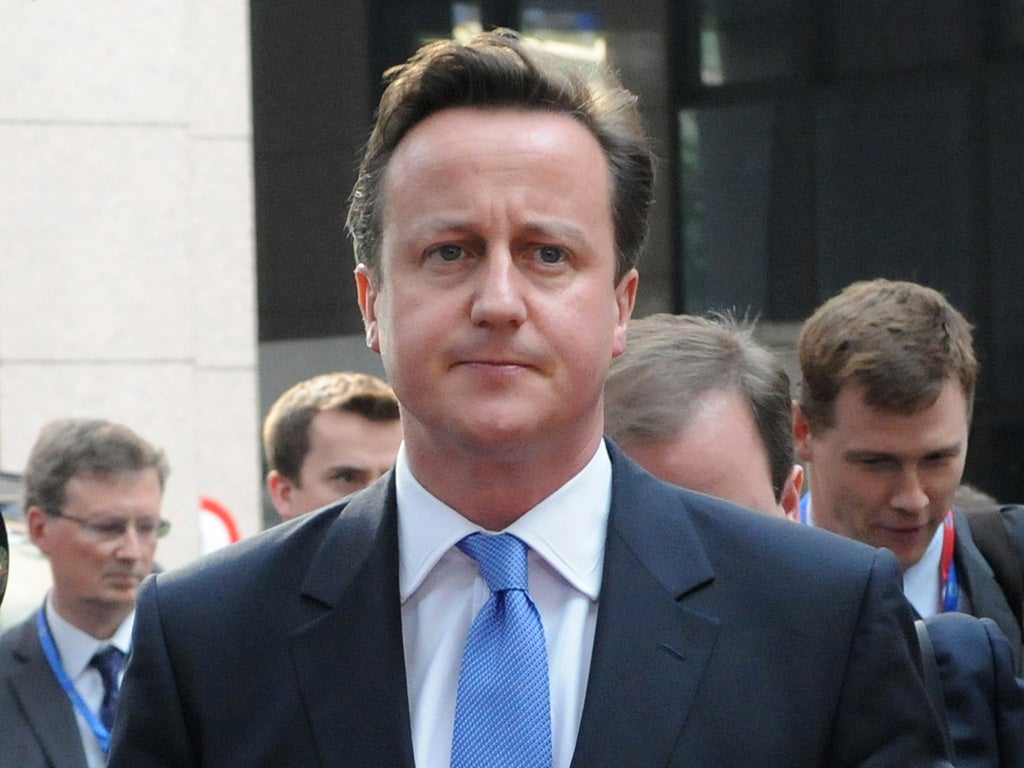Andrew Grice: A genuine U-turn would be on the 50p top rate of tax
Inside Westminster


'This is not a U-turn!" used to be the mantra of David Cameron's aides. I lost count of how many times I heard it. After his retreats on selling England's public forests and the Government's NHS reforms, the Prime Minister saw climbdowns as a sign of weakness and sought to avoid them.
Now he has done a U-turn on his ban on U-turns, abandoning one of his guiding principles since taking office. Three key measures in George Osborne's March Budget – the "pasty tax", 20 per cent VAT on static caravans and the cap on tax relief on charitable donations – were dumped in the space of four days this week.
It seems that Thatcher's law – "The Lady's not for turning", she told the Conservative conference in 1980 – has been consigned to the history books.
Ministers complain they can't win. The media will clamour for a change of policy and then accuse ministers of weakness when they buckle. "U-turn" fits neatly into headlines. In public, ministers argued feebly that they were part of a listening government. In private, they feared being seen as incompetent.
At least Mr Osborne did one thing right by getting his U-turns over quickly. The "charity tax" retreat was the most sudden of this week's about-turns. It had been pencilled in for the autumn but the Chancellor, after dumping his pasty and caravan taxes, decided to rush it out this week.
No doubt one attraction was an attempt to limit the media damage from Jeremy Hunt's appearance before the Leveson inquiry. True, the charities' reprieve led TV news bulletins. But yesterday's front pages, which gave more prominence to Mr Hunt, showed the press is not always distracted by a diversionary firework display.
Mr Osborne was mindful that Gordon Brown showed how not to U-turn it after he abolished the 10p starting rate of tax. He was in denial, insisting there would be no losers. The delay meant he eventually needed the mother of all U-turns: it cost £2.7bn but, politically, was money down the drain because he got no credit for it.
Indeed, obstinacy can cause more damage than retreating under fire. Baroness Thatcher's refusal to bend over her vote-losing, flagship poll tax was the spark for her own party's act of regicide. If Mr Osborne had not backed down over his Budget measures, he would have suffered messy Commons rebellions in the weeks ahead – and more damaging headlines. So U-turns can be the lesser of two evils.
Not that governments can expect much credit. Tory MPs are a hard bunch to please. While those with a constituency interest in pasties or caravans could claim victory, loyalists grumble because they have been defending unpopular decisions and feel the rug has been pulled from under them.
Some Tory insiders were tempted to argue the retreat on pasties showed that the Chancellor is in touch with ordinary people and recognises their concerns. Which, of course, begs the question why he introduced the tax in the first place.
Of course, it is much better to get decisions right first time. The post-Budget "omnishambles" shows there is something missing at the heart of the government machine – an early warning system to spot the nasties before they become public. I am sure others have been stopped before we knew about them but events of the past week suggest too many are slipping through.
Cabinet ministers hope their deck-clearing will be forgotten as the public enjoy the Diamond Jubilee celebrations. But the danger for the Government is that it fails to break out of its "omnishambles" rut and that every policy tweak is magnified by the media into yet another U-turn. Competence, once lost, is not easily regained.
As Nick de Bois, secretary of the 1922 Committee of Tory MPs, warned: "When it goes from a question of being a listening and responding government, it is quite possible that it becomes a government which has its competency challenged."
Despite all the fuss, the revisions to the Budget were at the margins. A real U-turn would have seen Mr Osborne admit the private sector recovery on which his economic strategy is based had failed to materialise, and announce a stimulus to start the economy.
Instead, the Treasury is being pushed into a Plan A-Plus as it scrabbles around for large-scale building, transport and housing projects, while denying it is adopting Plan B.
Crucially, a U-turning Chancellor would have abandoned the Budget's cut in the 50p top rate of tax, which advertised the Government's biggest weakness – that, in the words of the Tory MP Nadine Dorries, it is run by "two arrogant posh boys". The tax cut for those earning more than £150,000 a year will be a lasting symbol of this Government, remembered long after the pasty tax.
Join our commenting forum
Join thought-provoking conversations, follow other Independent readers and see their replies
0Comments